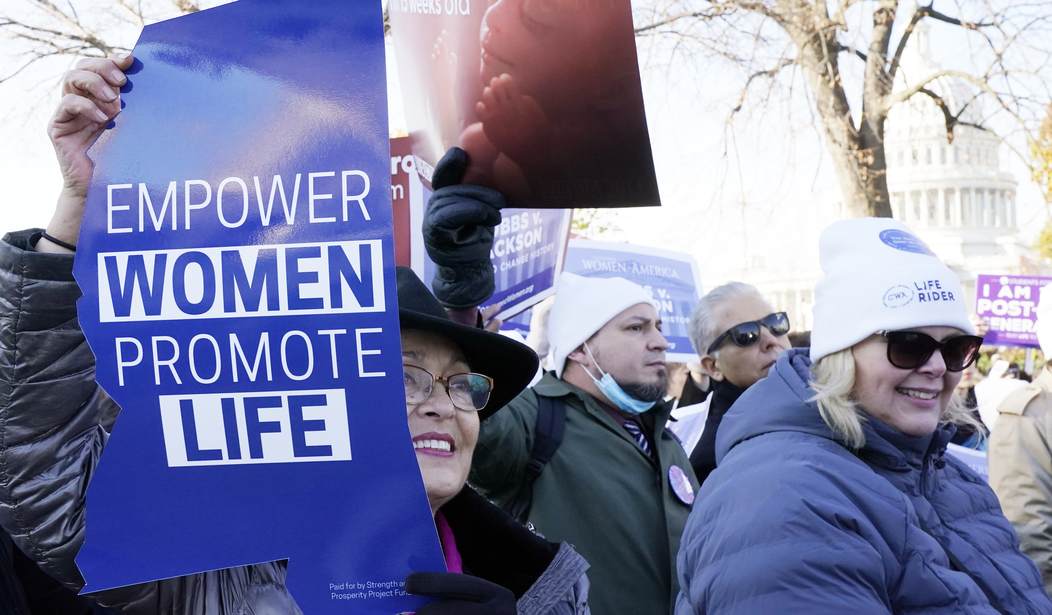This is a pleasant surprise, although less so than when I first glanced at the data and mistook what it’s saying.
Initially I thought it showed that the number of abortions performed on women who reside in Texas fell by 60 percent after passage of S.B. 8, the new law that allows private citizens to sue abortion providers who terminate a pregnancy after six weeks. That would be a huge drop, well beyond expectations. One estimate I’ve seen claims that if Roe is overturned, abortions in the United States would fall by “at least 14 percent” — an improvement over the status quo but not the sort of sea change that pro-lifers might be expecting once they achieve their great legal victory.
A 60-percent drop would be a sea change.
But what these numbers actually reflect are abortions performed at clinics located in Texas. The new law did convince many abortion providers to stop performing terminations after six weeks, it seems, which is all to the good. What’s not clear, though, is how many pregnant women in Texas hit the road for Oklahoma or New Mexico or Arkansas to get an abortion there instead. Did fewer women in Texas really end their pregnancies last September or did they just cross state lines to do it?
Dramatic data here, either way:

That’s 5,400 abortions in August 2021, when S.B. 8 passed, versus fewer than 2,200 the month following. I wondered if maybe there had been a “COVID effect” in the data, since Texas experienced its Delta wave in September. Maybe pregnant women were waiting a month for the risk of infection to subside before undergoing their abortion? But that’s unlikely: Texas had a big wave in January 2021 as well and abortion numbers didn’t decline then.
The big question is how many Texas women are traveling out of state to get abortions. There are many reports out there of clinics in neighboring states being “inundated” with requests, with the AP citing a “backlog” in appointments in some states in its story about Texas’s numbers today. The pro-choice Guttmacher Institute investigated in November and found examples of Texas women getting abortions in 12 different states that don’t border Texas, as far away as D.C. and Washington. One report last month claimed that roughly half of the recent patients at an abortion clinic in Wichita, Kansas, were from out of state, many of them from Texas.
Guttmacher even reports a “domino effect” in which some in-state residents who want abortions are being crowded out of appointments locally by Texas women, forcing those in-state women to seek abortions out of state themselves. Which means S.B. 8 probably has reduced the overall number of abortions, and not just among Texas’s own residents. “The clinics in states that border Texas do not have the capacity to meet the need for all Texans seeking abortion care,” Guttmacher notes. Unless a woman is willing to travel long distance, there just won’t be enough appointments regionally for everyone who wants one.
There’s no demographic data on who is and isn’t leaving the state for an abortion but it’s a cinch that poorer women are less likely to do so, just because they’re less able to do so. Axios points out that, except for New Mexico, the states neighboring Texas are conservative and therefore have strict requirements themselves for patients to obtain an abortion, which may deter some Texas women. And according to one expert who spoke to the outlet, “$550 is the average cost for an abortion and then when you start to add in travel, hotel and food costs, those costs skyrocket, potentially to hundreds of dollars or more.”
You can see the makings here of the post-Roe landscape, with clinics shutting down in red states, an explosion of new providers in blue states, and the left mobilizing to somehow cover the travel expenses of red-state women who want abortions in blue states. California’s already thinking about it, in fact. Maybe the abortion divide will further accelerate “the Big Sort,” in which Americans of different political persuasions increasingly relocate to cluster geographically with like-minded people. Maybe pro-choicers will ditch the red states they live in while pro-lifers ditch the blue ones.
They could even simplify things by swapping houses!
The success of Texas’s law in reducing the number of abortions performed in-state is destined to put pressure on Republican governors and legislatures in other states to follow suit. I’m thinking of Ron DeSantis and Florida, where the legislature has just introduced a ban after 15 weeks modeled after the Mississippi law that’s now in front of SCOTUS. DeSantis has already drawn some grumbling from pro-lifers that he should have gone further; today’s Texas data will make that grumbling grow louder. It may even be the case that Florida becomes one of the many abortion destinations for Texas women in their first trimester who can’t get an appointment at home anymore. The strictness of their state’s abortion ban will become a major litmus test for GOP governors with presidential ambitions post-Roe. DeSantis’s state is still purplish but I think he’ll eventually follow Texas’s lead, simply because he’ll have no choice if he wants to be viable as a presidential nominee.








